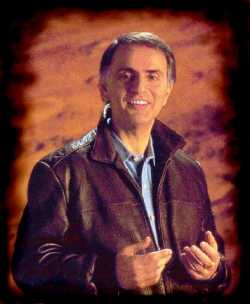





 |
||||
 |
 |
 |
 |
 |


"We are a way for the Cosmos to know itself"
Carl Sagan
Sagan, Carl Edward (1934 - 1996) was the David Duncan Professor of Astronomy and Space Sciences and Director of the Laboratory for Planetary Studies at Cornell University. Sagan was a member of the SETI Institute Board of Trustees at the time of his death. He has played a leading role in the Mariner, Viking, and Voyager spacecraft expeditions to the planets, for which he received the NASA Medals for Exceptional Scientific Achievement and (twice) for Distinguished Public Service.Once a research assistant of the Nobel Prize-winning geneticist H. J. Muller, his continuing research on the origin of life began in the 1950s. The Masursky Award from the American Astronomical Society cites "his extraordinary contributions to the development of planetary science. As a scientist trained in both astronomy and biology, Dr. Sagan has made seminal contributions to the study of planetary atmospheres, planetary surfaces, the history of the Earth, and exobiology. Many of the most productive planetary scientists working today are his present and former students and associates."
His book Cosmos (accompanying his Emmy- and Peabody-award-winning television series of the same name) was the best-selling science book ever published in the English language. His novel Contact is soon to be major motion picture (Warner Bros.). Co-founder and President of The Planetary Society, he severs as Distinguished Visiting Scientist, Jet Propulsion Laboratory, California Institute of Technology. Dr. Sagan has received the Pulitzer Prize, the Oersted Medal, and many other awards - including eighteen honorary degrees from American colleges and universities - for his contributions to science, literature, education, and the preservation of the environment. Sagan was a member of the SETI Institute Board of Trustees at the time of his death. ( from SETI Institute ).
1934 Born in New York, N.Y.
1960 Obtained PhD from the University of Chicago
1961 Wrote Atmospheres of Mars and Venus
1962-8 Astrophysicist at Smithsonian Astrophysical Observatory
1966 Wrote with Jonathon Norton Leonard and the editors of Life: Planets
1966 Wrote with I S Shklovskii: Intelligent Life in the Universe
1968 Director of Laboratory of Planetary Studies at the Center for
Radiophysics and Space ResearchProfessor of Astronomy and Space Sciences at
Cornell University
1970 Wrote Planetary Exploration
1972 Worked on Mariner mission to Mars
1973 Wrote The Cosmic Connection: An Extraterrestrial ConnectionWrote with
others Mars and the Mind of ManEdited Communication with Extraterrestrial
Intelligence Editor of the planetary science journal, Icarus
1973 Placed the message from Earth on Pioneer 10Awarded the Prix Galabert:
the international astronautics prize
1975 Won the Joseph Priestley award for distinguished contributions to the
welfare of mankindWrote Other Worlds
1977 Wrote The Dragons of Eden: Speculations on the Evolution of Human
IntelligenceWrote with others Murmurs of Earth: The Voyager Interstellar Record
1978 Won the Pulitzer Prize for Dragons of Eden
1979 Wrote Broca’s Brain: Reflections on the Romance of Science
1980 Co-producer and narrator of television series Cosmos
1981 Published text of Cosmos
1980s Researched environmental effects of nuclear war
1985 Wrote with Ann Druyan: CometWrote novel, ContactWrote The Nuclear Winter:
The World After Nuclear War
1990 Wrote with Richard Turco: A Path Where No Man Thought: Nuclear Winter
and the End of the Arms Race
1992 Wrote with Ann Druyan: Shadows of Forgotten Ancestors: A Search for Who
We Are
1994 Wrote Pale Purple Dot: A Vision of the Human Future in Space
1996 Wrote The Demon-Haunted World: Science as a Candle in the Dark Died
1997 Posthumous publishing: Thoughts on Life and Death at the Brink of the
Millenium